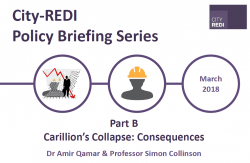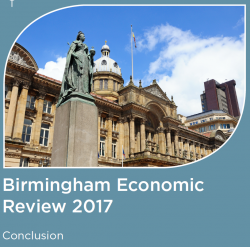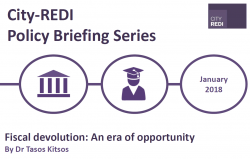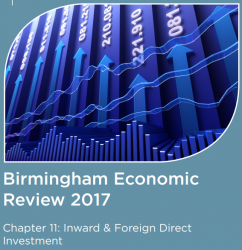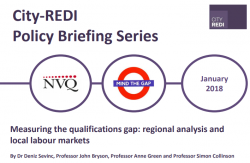Carillion, the second-largest construction firm in the UK, were proud of their commitment to support regional growth and small-scale suppliers. As part of this commitment, they directed 60% of project expenditure to local economies. Following the collapse of the firm, this positive multiplier effect became a significant, negative multiplier effect, particularly damaging to small-scale suppliers … Continue reading “Part B: The Consequences of Carillion’s Collapse”
Category: City-REDI publications
Part A: The Causes of Carillion’s Collapse
Racing to secure bids over rival construction companies, Carillion, the second-largest construction firm in the UK, hit a financial tipping point, lost the backing of the banks and collapsed. Its aggressive growth strategy and the diversification of its business portfolio increased the complexity of its internal structure. Coupled with poor oversight of its day-to-day operations, … Continue reading “Part A: The Causes of Carillion’s Collapse”
UK Automotive Supply Chains Are Not Lean!
With its origins traceable to the Japanese Toyota Production System and the publication of one of the best-selling books amongst both academics and practitioners, ‘The Machine that Changed the World’, the concept of lean production has received substantial attention and has become well embedded within automotive studies in Operations Management (OM) and Supply Chain Management … Continue reading “UK Automotive Supply Chains Are Not Lean!”
Birmingham Economic Review 2017: Conclusion
The Birmingham Economic Review was produced in October 2017 by City-REDI, the Greater Birmingham Chambers of Commerce and the West Midlands Growth Company. The review highlights the current strengths and weakness of the Birmingham economy, as well as looking at the opportunities and threats that might impact upon it in the future. This is Chapter 12 of The Review, the … Continue reading “Birmingham Economic Review 2017: Conclusion”
Fiscal devolution: An era of opportunity
City-REDI has prepared this brief to inform the debate on fiscal devolution. The UK has traditionally been a fiscally centralised system with most of the local authority income coming from government transfers. The acknowledgment of the importance of place and local leadership in policies such as the industrial strategy, devo deals and the budget, together … Continue reading “Fiscal devolution: An era of opportunity”
City-REDI publications series: Professor John Bryson – Repatriation or Reshoring of Manufacturing to the U.S. and UK: Modular Theory-Building, Dynamics and Global Production Networks or From Here to There and Back Again
As part of a new blog series, we will be highlighting the excellent research produced by the City-REDI team since 2015, with the aim of creating an online searchable library. You can view this work by searching the blog with the relevant tag, either using the name of the author or the year of the publication. The … Continue reading “City-REDI publications series: Professor John Bryson – Repatriation or Reshoring of Manufacturing to the U.S. and UK: Modular Theory-Building, Dynamics and Global Production Networks or From Here to There and Back Again”
The Birmingham Economic Review 2017 – Inward & Foreign Direct Investment
The Birmingham Economic Review was produced in October 2017 by City-REDI, the Greater Birmingham Chambers of Commerce and the West Midlands Growth Company. The review highlights the current strengths and weakness of the Birmingham economy, as well as looking at the opportunities and threats that might impact upon it in the future. This is a commentary on Chapter 11 of … Continue reading “The Birmingham Economic Review 2017 – Inward & Foreign Direct Investment”
Measuring the qualifications gap: regional analysis and local labour markets
The latest City-REDI Policy Briefing, ‘Measuring the skills gap: A regional analysis of a local labour market’ is a focused analysis of the NVQ (national vocational qualification) qualification ladder levels 1 through 4, in specific geographic regions of the UK. It examines the types of qualifications that employers find missing from candidates applying for jobs, … Continue reading “Measuring the qualifications gap: regional analysis and local labour markets”
The Birmingham Economic Review 2017 – The Visitor Economy
The Birmingham Economic Review was produced in October 2017 by City-REDI, the Greater Birmingham Chambers of Commerce and the West Midlands Growth Company. The review highlights the current strengths and weakness of the Birmingham economy, as well as looking at the opportunities and threats that might impact upon it in the future. This is a commentary on Chapter 10 of … Continue reading “The Birmingham Economic Review 2017 – The Visitor Economy”
The Birmingham Economic Review 2017 – Innovation
The Birmingham Economic Review was produced in October 2017 by City-REDI, the Greater Birmingham Chambers of Commerce and the West Midlands Growth Company. The review highlights the current strengths and weakness of the Birmingham economy, as well as looking at the opportunities and threats that might impact upon it in the future. This is a commentary on Chapter 9 of … Continue reading “The Birmingham Economic Review 2017 – Innovation”

